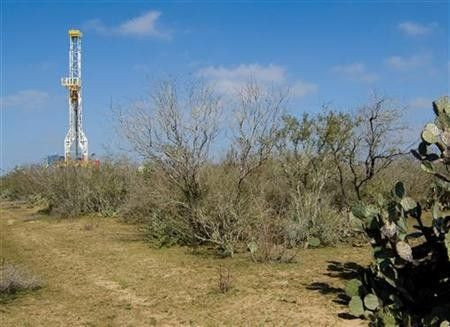Violent Drug Cartels In Northern Mexico Threaten To Forestall Country's Fracking Boom

Violent drug cartels running rampant in northern Mexico are threatening to forestall the country’s much-anticipated fracking boom.
In a recent incident in Tamaulipas state, about 30 workers for oil and gas company Weatherford International were caught in the crossfire of gangs feuding for control of the U.S. drug market, Bloomberg News reported. Gunmen rolled up in a makeshift tank and blasted the hotel where the Weatherford workers were staying with bullets. The employees were forced to flee under police escort.
Mexico shares part of the Eagle Ford shale formation with southern Texas, where drillers have sparked an oil and gas revival and are helping place the United States on track to become the world’s top oil producer in the coming years. But while developers have completed nearly 9,000 wells in Texas, only a handful of test wells have been drilled in Mexico, in large part because of the drug-related violence.
“Shale will not take off in Mexico like it did in Texas in the near future,” Dwight Dyer, a Mexico City-based senior analyst for consulting firm Control Risks, told Bloomberg. “Unless the security situation along the northeastern border improves significantly, smaller companies will probably take their time before jumping in.”
The Eagle Ford deposits are critical to boosting Mexico’s oil production, which has steadily declined since its peak in 2004. Mexico’s Burgos Basin is estimated to hold 600 trillion cubic feet of recoverable shale gas and 13 billion barrels of recoverable shale oil, the sixth-largest and eighth-largest resources in the world, respectively, according to Oilprice.com.
Unless new resources can be tapped, Mexico could become a net importer of oil within a few years.
The federal Ministry of Energy has estimated that $100 billion in investment is needed over the next decade to develop Mexican shale resources, money that will likely come from private developers. Last year, the Mexican government amended its constitution to allow foreign companies to drill in Mexico, potentially ending the 76-year monopoly held by state-owned Petroleos Mexicanos. So far, Pemex has invested only about $250 million in Mexico shale gas exploration and production, Oilprice.com noted.
Dueling drug gangs aren’t the only hurdles Mexico must clear before it can partake in the shale boom. To tap the Eagle Ford deposits, developers will need to use hydraulic fracturing, or fracking, which requires blasting vast amounts of water, chemicals and sand into dense rock to release crude oil and natural gas. Tamaulipas, Coahuila and Nuevo Leon, the three Mexican states with the most shale deposits, are comprised of mostly desert, limiting the amount of available water supplies needed for fracking to drill wells.
Fracking also requires a substantial infrastructure network and a pool of highly-trained employees, both of which Mexico currently lacks. Pipelines, roads and rail networks are needed to transport raw materials and capital equipment, and they're also needed to store, transport and refine the fossil fuels. Skilled engineers, geologists and other experts are needed to run the unconventional drilling operations, the San Antonio Business Journal said.
Violence is likely to keep smaller oil and gas wildcatters away from Mexico’s shale deposits for the time being.
The gang activity “does raise the cost of doing business,” Duncan Wood, director of the Mexico Institute at the Woodrow Wilson International Center for Scholars, told Bloomberg. “For the bigger companies that’s not a big deal, but for the smaller companies, it’s something they have to factor in.”
© Copyright IBTimes 2024. All rights reserved.





















